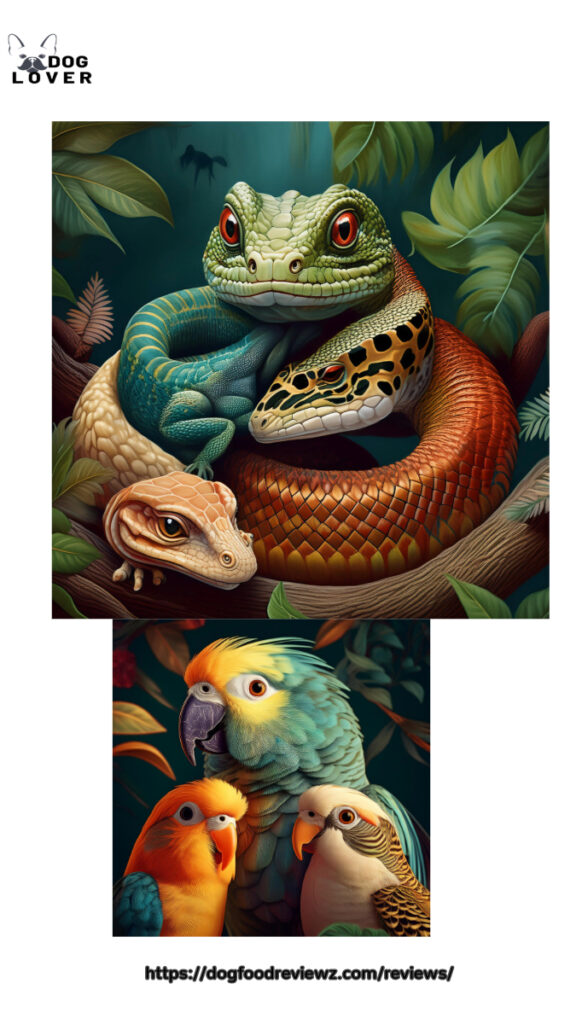Owning and caring for exotic pets is an undeniably joyful experience.
However, these pets also have unique health challenges.
In this article, we will discuss exotic pet insurance, its benefits, challenges, and the factors to consider in choosing exotic pet insurance plans.
Come with us.
Exotic Pets

While cats and dogs are the most common pets, unconventional or non-traditional pets, otherwise referred to as exotic pets, have recently become very popular among households.
But what exactly are exotic pets?
An exotic pet is any non-traditional animal generally thought of as wild that has been adopted and domesticated. Examples include birds, reptiles, fish, invertebrates, and pocket pets.
Exotic pets such as parrots, rats, snakes, mice, tigers, cockatoos, iguanas, and box turtles have found their way into the hearts and homes of many.
Unlike the more common pets such as dogs and cats, exotic pets have unique care requirements and often need specialized veterinary care at some point in their lives.
Whether it’s providing the right habitat, ensuring a nutritious and balanced diet, or other medical care needs, the cost of caring for exotic pets is undeniably high.
Unique Healthcare Needs of Exotic Pets
The details of exotic pet care are different from those of traditional pets. Understanding these unique needs is essential in ensuring their general well-being.
Some of the unique healthcare needs of exotic pets include:
- Housing: Exotic pets develop and thrive in specific environments that are different from our own. They need specialized habitats that closely mimic their natural environment to promote their physical and mental health. You must ensure proper size, lighting, temperature, and humidity for your pet.
- Feeding and nutrition needs: Exotic pets have specific nutritional needs that vary from one species to another. It’s essential to thoroughly understand your pet’s dietary needs for optimal health. Ensure you give a fully balanced diet that’s specific to their specie to avoid nutritional deficiencies.
- Enrichment: Just like their traditional counterparts, exotic pets need physical and mental stimulation. You’ll need to provide sufficient space to climb, fly, climb, and explore. You can also provide puzzles, toys, and hiding spots to help curb boredom. These pets also need regular interaction with their owners to build trust and bond.
- Veterinary care: Exotic pets have special health issues that need specialized care from professional exotic pet vets. They also need regular checkups for long-term wellness.
Pet insurance is vital in ensuring the health of your pet. It helps you cover unexpected veterinary expenses arising from illnesses, injuries, and accidents.
With an insurance plan, you will be at peace knowing that your pet’s veterinary care needs are covered at all times.
Why Exotic Pet Insurance is Needed
Similar to traditional pets, exotic pets are prone to suffer from unexpected health issues.
Because of their unique needs, these pets require specialized treatments which can be very costly given the limited veterinary expertise available. Exotic pet insurance can help mitigate these costs.
Availability of Pet Insurance for Exotic Pets
Exotic pet insurance is not as widespread as insurance for common pets such as dogs and cats. However, there are still some insurers that provide coverage for exotic pets.
Examples of insurance companies that offer exotic pet coverage include:
- Nationwide which provides coverage against accidents and illnesses for exotic pets such as reptiles, birds, and other exotic pets.
- ASPCA offers accident-only and accident and illness plans for various kinds of pets.
- MetLife offers coverage for reptiles, birds, ferrets, and rabbits.
- Pet Assure offers discounts that provide savings on veterinary bills.
The following are some of the pets that exotic pet insurance covers:
- Reptiles and amphibians including snakes, turtles, chameleons, frogs, and bearded dragons.
- Birds such as parrots, cockatiels, lovebirds, and canaries among others.
- Small mammals including guinea pigs, hedgehogs, pot-bellied pigs, etc
- Horses
- Rabbits
- Iguanas
- Ferrets
The Challenges of Insuring Exotic Pets
Traditional pet insurance often excludes exotic pets due to their diverse nature. Additionally, these pets have unique health issues and often require specialized treatment from professional exotic vets. These vets are also limited in number. All this makes finding coverage for exotic pets quite challenging.
Due to their unique health requirements, the veterinary care costs for exotic pets are very high as they require specialized treatment.
What’s Covered and What’s Not?
Similar to insurance for conventional pets, exotic pet insurance offers coverage for expenses resulting from injuries and common medical issues.
- Exotic pet insurance coverage includes the following:
- Accidental injuries such as broken bones, poisoning, spraining, tissue traumas, and lacerations.
- Common illnesses like ear and eye infections, cancer, and other infections
- Prescription medication for issues such as skin infection.
- Diagnostic tests include blood tests, x-rays, blood tests, biopsies, radiography, and MRIs.
- Hospitalization costs such as surgery, treatment, and emergency care.
- Hereditary issues.
The common exotic pet insurance exclusions include:
- Pre-existing conditions
- Routine care, examinations, and vaccinations
- Elective procedures such as wing clipping and nail trimming
- Costs unrelated to veterinary care
- Breeding costs
- Food and supplements
Some differences in coverage for exotic vs. traditional pets include:
- Limited coverage: Coverage for exotic pets is more limited compared to traditional pets because many insurers don’t have experience with exotic pets and thus don’t understand their unique needs.
- Higher cost: Exotic pets have special needs and require more special care resulting in higher vet costs and consequently higher insurance costs compared to traditional pets.
Key Considerations When Choosing Exotic Pet Insurance
- Coverage specifics for exotic species: Consider the coverage options for different species. Ensure you get comprehensive coverage that includes illnesses, accidents, diagnostics, surgeries, and emergency care.
- Premium costs and how they vary by species: Determine how much the premiums will cost based on your pet’s species.
- Deductibles, payout limits, and reimbursement rates: Find out how much you’ll need to pay out of your pocket before your policy commences and the percentage of the veterinary costs to be reimbursed.
- Vet accessibility and whether they accept exotic pet insurance: Find out whether there are professional exotic vets within your locality and if they accept pet insurance.
Tips for Insuring Exotic Pets
- Researching and comparing insurance providers: Research thoroughly and compare the companies offering exotic pet insurance and their coverage options.
- Understanding policy details: Read and understand the policy details including what’s covered and what’s excluded to avoid frustrations.
- Keeping thorough medical records: Ensure you maintain all your pet’s medical records to serve as supporting documents to your claim request.
Alternatives to Pet Insurance
If for any reason pet insurance is unavailable or unsuitable for you, these are other alternatives you can use to help you manage veterinary costs.
- Self-funding and savings plans: You can set up a dedicated savings account to help you set aside funds for your pet’s medical expenses.
- Veterinary discount plans: Check out and take advantage of any available discount plans on in-house medical services.
- Pet savings accounts and emergency funds: Consider opening up a savings account and making deposits specifically for your pet’s medical expenses
- Exotic pet organizations and specialty funds: Look for exotic pet organizations that offer veterinary care support for exotic pets.
Steps to Take Before Choosing an Exotic Pet Insurance Plan
- Researching providers that may offer coverage for exotic pets: Explore different insurers and compare their coverage options for exotic pets.
- Consulting with exotic pet veterinarians about recommended care and coverage: Talk to your vet about your pet’s health care needs and seek his advice on the best coverage plan.
- Reading reviews and asking for referrals from exotic pet communities: Seek reviews from your friends, family, and colleagues, or search on the internet for reviews and referrals.
Conclusion
Exotic pets have special health requirements and require special care which can be very costly. It’s thus essential to consider exotic pet insurance to help you manage your pet’s veterinary care expenses and ensure their health.
Whether by taking an insurance plan or alternative saving methods, it’s crucial to plan for your exotic pet’s healthcare needs in advance for optimal health and longevity.


